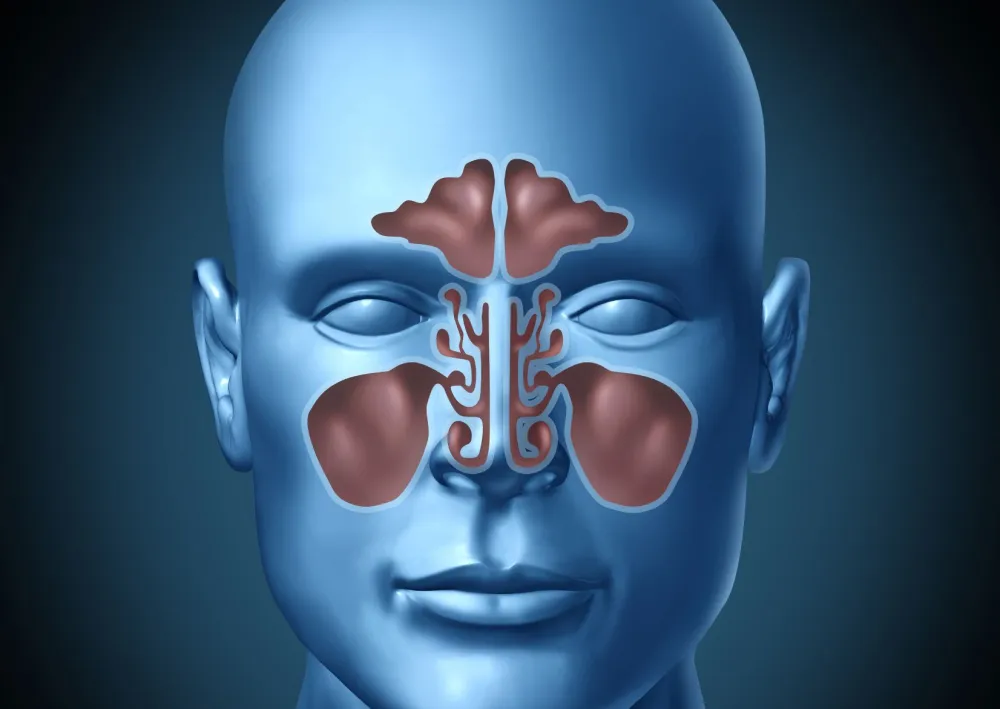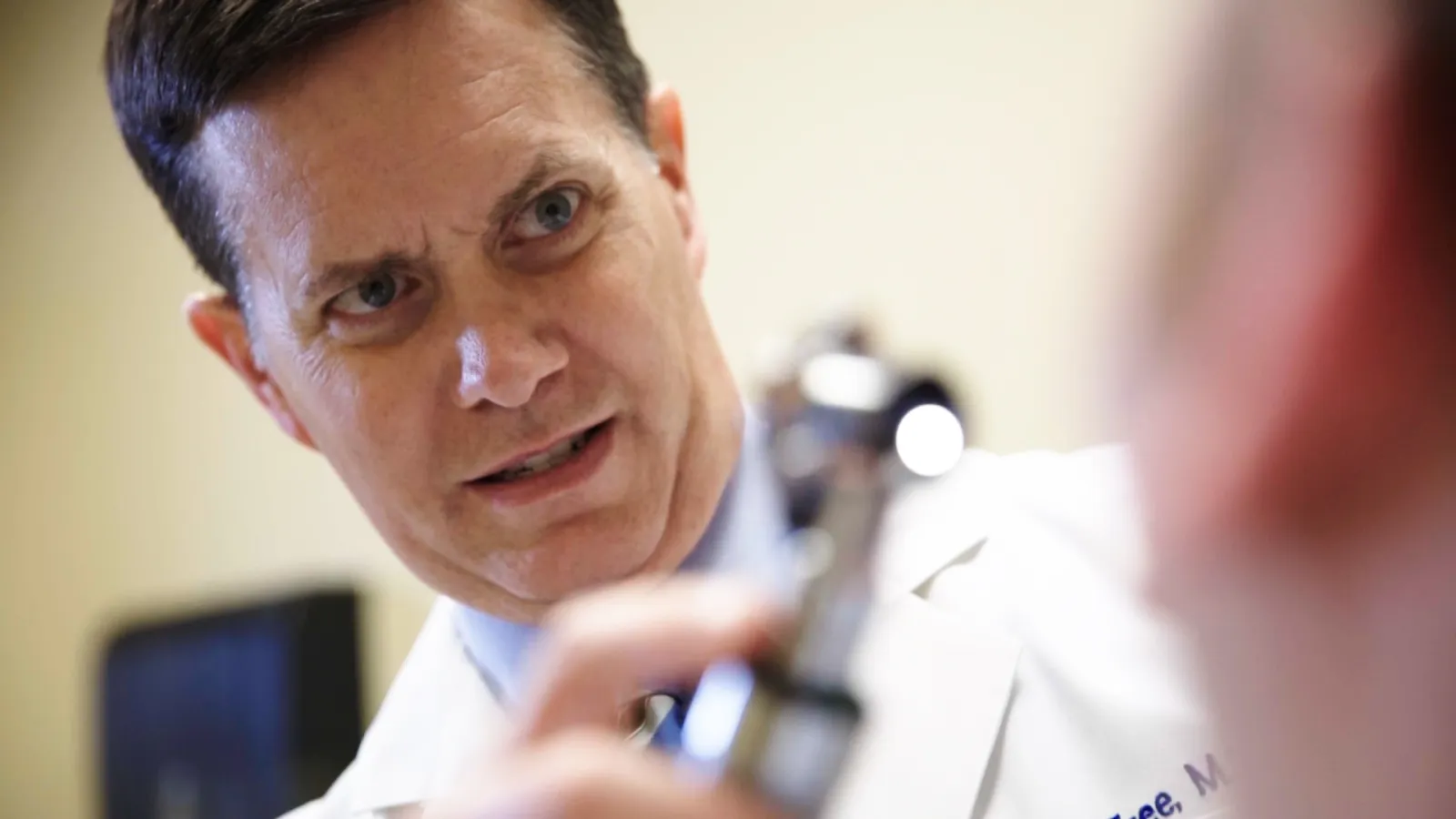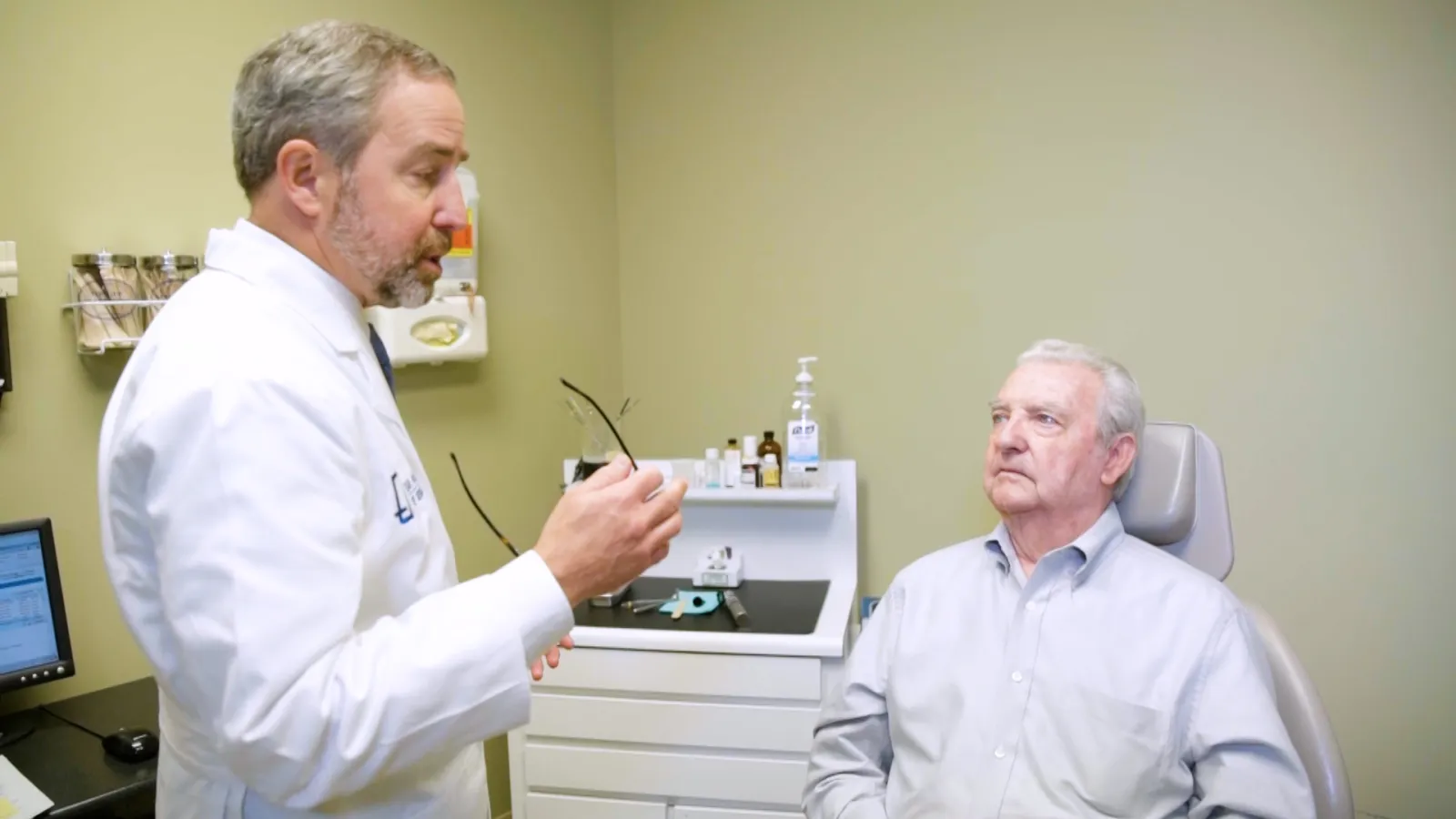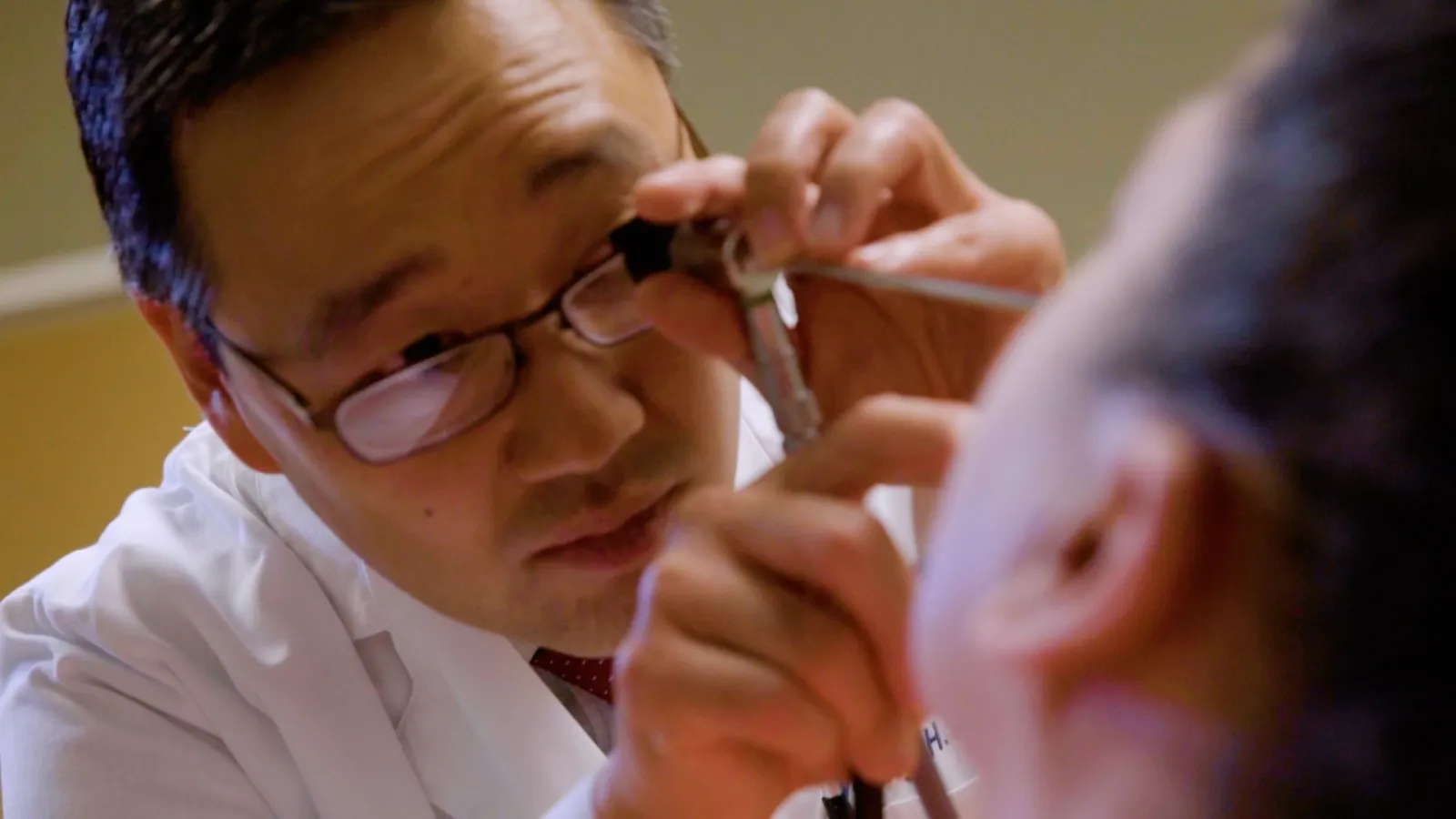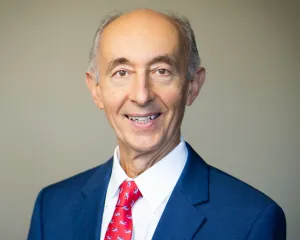
Chronic Sinusitis
If you have a cold or runny nose that won't go away, there's a good chance you have sinusitis - a condition where the sinuses are infected or inflamed. According to the Centers for Disease Control and Prevention (CDC), more than 26.9 million American adults - or 11 percent of all adults - are diagnosed with sinusitis on an annual basis. In fact, Americans spend more than $1.5 billion in "sinus" medicine for the symptoms of sinus disease (i.e., stuffy nose, congestion, headache and nasal drainage). That's why the team at ENT of Georgia South is so dedicated to helping Metro Atlantans overcome this often painful, debilitating condition. Our physicians are some of the best in the country in the relief and prevention of chronic sinusitis. We are Atlanta's leading provider of office-based Balloon Sinuplasty as well as a variety of technologically-advanced surgical procedures.
Antibiotics are a popular remedy that only provides temporary relief, but our physicians well treat the root cause of your chronic sinusitis, providing you with lasting relief without depending on antibiotics. Schedule an appointment online for one of our 3 convenient offices to breathe better!
Does everyone have
Sinuses?
Yes -- even a newborn baby has little tiny ones. Sinuses begin as pea-sized pouches extending outward from the inside of the nose into the bones of the face and skull. They expand and grow through childhood into young adulthood. They are air pockets - cavities that are lined with the same kind of membranes that line the nose, and they are connected to the inside of the nose through small openings about the size of a pencil lead.
What do sinuses do?
Sinuses are part of the nasal air and membrane system that produces mucus. Normally, the nose and sinuses produce between a pint and a quart of mucus and secretions per day. This mucus passes into and through the nose, sweeping and washing the membranes, picking up dust particles, bacteria, and other air pollutants along the way. The mucus then flows backward into the throat where it is swallowed, down into the stomach where acids destroy any dangerous bacteria. Most people do not notice this mucus flow because it is just a normal bodily function.
What is
"Post-Nasal Drip?"
When the nasal passages are irritated by allergies, air pollution, smoke, or viral infections (such as a "cold"), then the nose and sinus membranes secrete more than the normal amount of mucus. This will be a clear, watery, and profuse mucus that is supposed to wash away the irritation or allergy. This is the most common type of "post-nasal drip." Another form of "post-nasal drip" is mucus that is thick and sticky. This occurs when the air is too dry and the nose membranes cannot produce enough moisture to put into the mucus for it to flow easily. Bacterial infections also produce a thick, sticky mucus with pus in it, turning it a yellow or green color.
What is
Sinusitis?
"-itis" is a medical term for infection or inflammation, so "sinusitis" is an infection or inflammation of the sinuses. A typical case of acute sinusitis begins with a cold or "flu" or an allergy attack that causes swelling of the nasal membranes and increased watery mucus production. The membranes can become so swollen that the tiny openings from the sinuses become blocked. When mucus and air cannot flow easily between the nose and sinuses, abnormal pressures occur in the sinuses, and mucus can build up in them. This creates a pressure-pain in the forehead or face, between and behind the eyes, or in the cheeks and upper teeth, depending on which sinuses are involved.
A blocked sinus cavity filled with mucus becomes a fine place for bacteria to grow. When a person's "cold" lasts more than the typical week or so, and when his mucus turns yellow-green or develops a bad odor or taste, then a bacterial infection has probably taken over. The pressure and pain in the face and forehead can be quite severe in acute bacterial sinusitis.
Chronic sinusitis occurs when the sinus opening is blocked for an extended period. Headaches are less prominent in chronic sinusitis, but congestion and unpleasant nasal secretions usually persist. Also, fleshy growths known as polyps can develop as an exaggerated form of inflammatory swelling of the membranes.
Some cases of sinusitis come from infections in the upper teeth that extend into the sinuses.
Is sinusitis dangerous?
Most cases of sinusitis respond promptly to medical treatment and are not serious. However, an infection that is in the sinus is also very close to the eye and to the brain. Extension of a sinus infection to the eye or brain is rare. Furthermore, it is not healthy for the lungs to have infected mucus dripping down from infected sinuses. Bronchitis, chronic cough, and asthma are often aggravated, or even brought on, by sinusitis.


What is a
Sinus Headache?
A headache in the face, cheeks, forehead, or around the eyes which comes on during a "cold," or when the nose is congested and runny or filled with mucus, is probably a "sinus headache": one caused by sinus infection. Another kind of sinus headache is the one that occurs in the sinus areas during descent (landing) in an airplane, especially if you have a cold or active allergy (this is called a vacuum headache).
Unfortunately, there are many other causes of headaches that can be confused with sinusitis. For example, migraine and other forms of vascular or "tension" headaches also give pain in the forehead and around the eyes, and they may even cause a slight stuffy-runny nose. But they are more likely to come and go away in a day or so without a physician's treatment, whereas sinusitis usually gives a headache that lasts for days or weeks until it is treated with antibiotics. Furthermore, intermittent headaches that cause nausea and vomiting are more typical of a migraine-type headache than sinusitis. Severe, frequent, or prolonged headaches deserve a visit to a physician for diagnosis and treatment.
Who gets into
Sinus Trouble?
Actually, anyone can "catch" a sinus infection, but certain groups of people are more likely to develop sinusitis:
- People with allergies: An allergy attack, like a "cold," causes swelling in the nasal membranes that will block the sinus openings, obstruct the mucus drainage, and predispose to infection.
- People with deformities of the nose that impair good breathing and proper drainage: Examples are a crooked nose or a deviated septum (the structure between the nostrils that divides the inside of the nose into right and left sides).
- People who are frequently exposed to infection: School teachers and health workers are especially susceptible.
- People who smoke: Tobacco smoke, nicotine, and other pollutants impair the natural resistance to infection.
What will a doctor do for
My Sinuses?
Your physician will ask you questions about your breathing, the nature of your nasal mucus, and the circumstances (time of day or seasons) that give you symptoms. Be prepared to explain your headaches: When and how often they occur, how long they last, and if they are associated with nausea, vomiting, vision changes, or nasal congestion. An otolaryngologist-head and neck surgeon is the kind of physician who will especially examine your ears, nose, mouth, teeth, and throat with particular attention to the appearance of your nasal membranes and secretions. He/she will check for deformities of your nose that impair breathing and for tenderness over your sinuses. X-rays of your sinuses might be needed.
Treatment will depend on the diagnosis that your physician establishes, Infections may require either antibiotics or surgery or sometimes both. Acute sinusitis most likely will improve on medication, but chronic sinusitis more often requires surgery. If your symptoms are due to allergy, migraine, or some other disease that mimics sinusitis, your doctor will have alternative treatment plans.
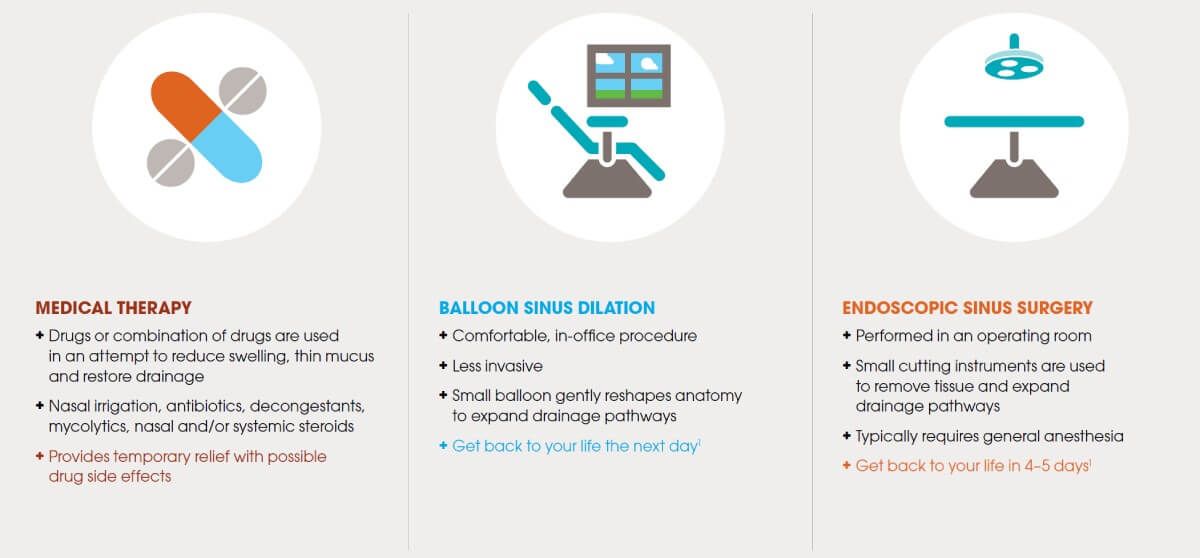

What can I do for
My Own Sinuses?
- Manage your allergies if you have them. Use a humidifier when you have a cold, and sleep with the head of your bed elevated. This promotes sinus drainage. Decongestants can also be helpful, but they contain chemicals that act like adrenaline and are dangerous for persons with high blood pressure, irregular heart rhythms, heart disease, or glaucoma. They are also like stimulants that can produce sleeplessness. You should consult your physician before you use these medications.
- Avoid air pollutants that irritate the nose, especially tobacco smoke.
- Live by good health practices that include a balanced diet and regular exercise.
- Minimize exposure to persons with known infections if possible, and practice sanitary health habits when you must be around them (such as hand washing and avoidance of shared towels, napkins, and eating utensils).
A large variety of non-prescription medications are sold as sinus remedies, but it is folly to try them before a proper diagnosis is established. The best advice you can ever get, of course, is what is given to you by your physician who evaluates your own special symptoms and examines your own nose and sinuses.
Our Convenient
Office Locations
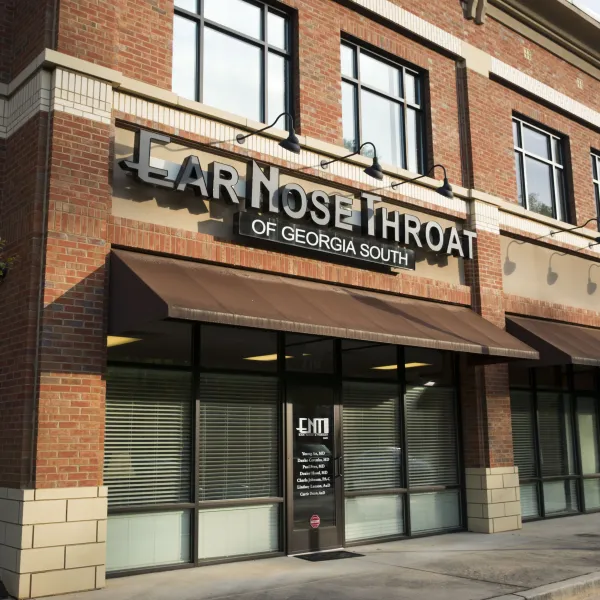
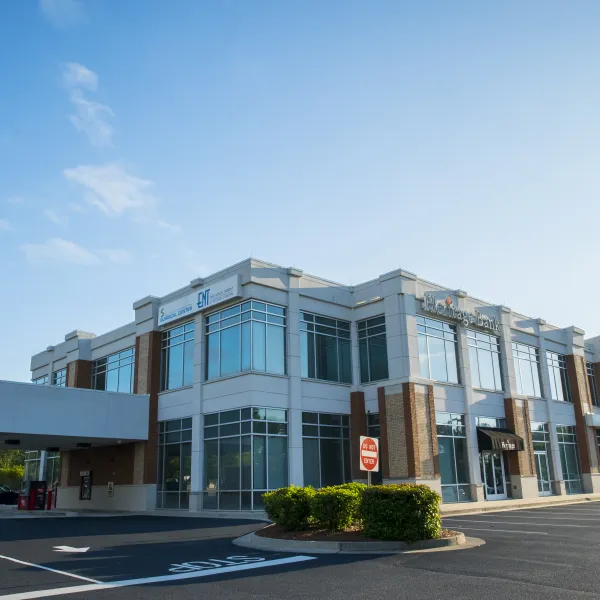
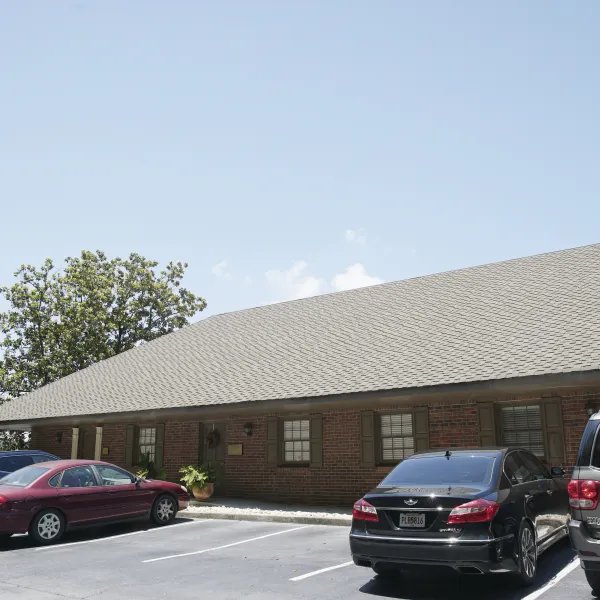
Buckhead
1218 W Paces Ferry Rd NW
UNIT 208
Atlanta, GA 30327
Monday - Thursday 8am - 4:30pm
Friday - 8am-2:30pm

